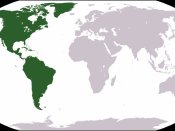Chip Bothmann
HIST 1052
Book Review
Matthew Restall, Seven Myths of the Spanish Conquest
New York, Oxford University Press, 2003
3 pages, 889 words
Myths of the Spanish Conquest is broken into seven chapters, each dedicated to a different myth or mis-conception regarding the Spanish conquest. In debunking these myths, Matthew Restall works with three themes regarding the conquest. First, that the European discovery of the Americas was one of the greatest events in human history. Second, that the conquest was the achievement of "a few great men," which he subsequently describes as "a handful of adventurers." These two themes lead to a third theme, or question. "If history's greatest event - the European discovery and conquest of the Americas - was achieved by a mere "handful of adventurers," how did they do it?"
One common answer to this question is, "because they were exceptionally great men." The "theory of exceptional men" paints the most well known of the Spaniards - Columbus and Cortes - as "larger than life characters," who "still enjoy extraordinary name recognition almost a half a millennium after their deaths.
This theory credits the courage, audacity and brilliance of each man as reasons for success in both reaching the Americas and conquering the Mexica, respectively. As Restall points out, nothing was unique regarding Columbus and his accomplishments. He offered no original plan or vision. In actuality, the Portuguese were mostly responsible for the Atlantic expansion. This expansion began over two hundred years prior, over time establishing a zone that was bordered by the Azores in the north, the Canary Islands in the south and African coast to the east. Restall claims that Columbus failed to become part of this process in the 1480's because "he lacked the connections and persuasive ideas of other navigators. Even after...


